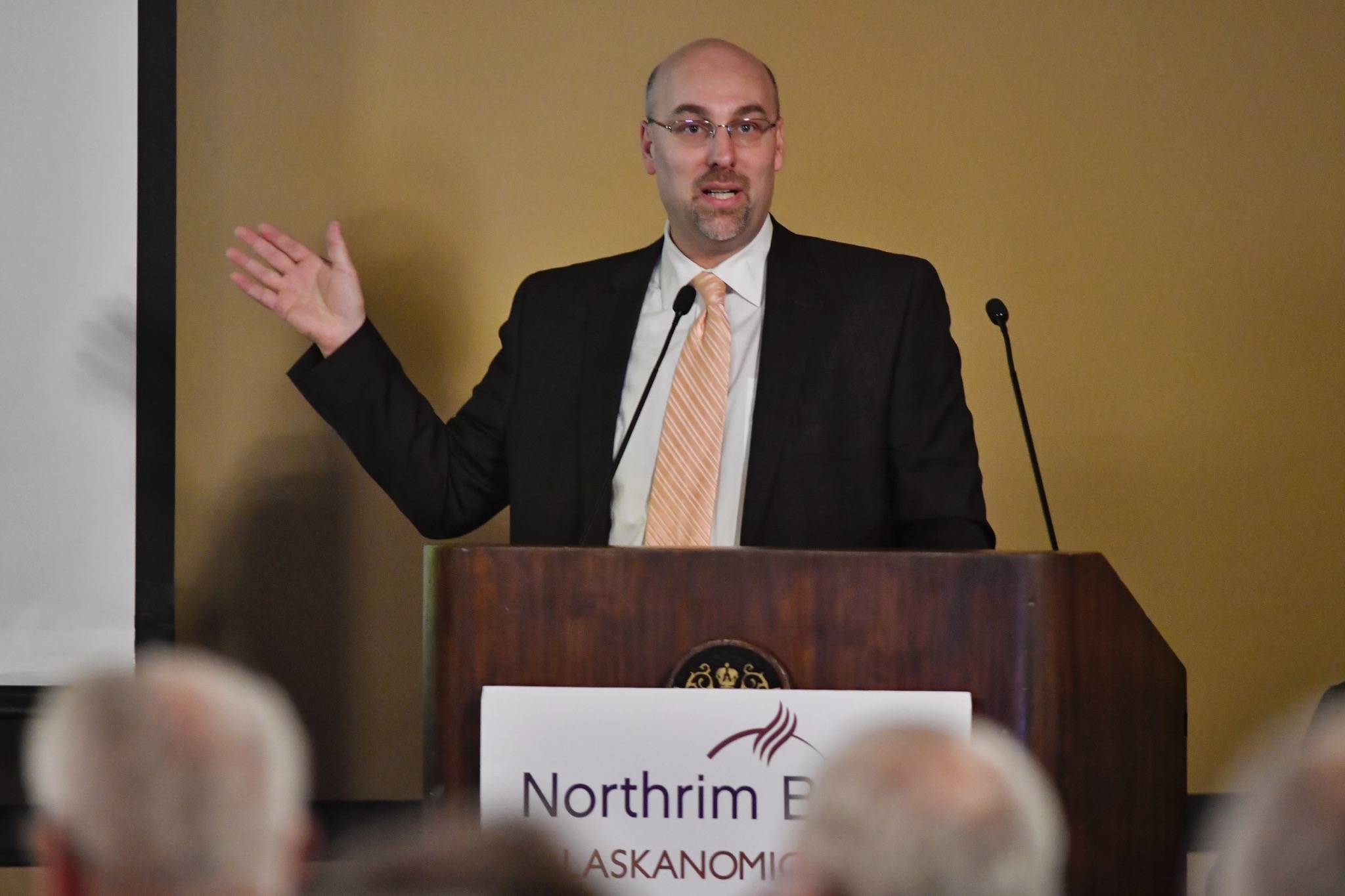Alaska’s economy is showing signs of life after a three-year skid, but it has an uncertain short-term future, said economic experts Monday during the 2019 Economic Luncheon.
The good news came in the form of the apparent death rattle of a three-year statewide recession, and the uncertainty stemmed from the impact of possible spending cuts in Gov. Mike Dunleavy’s proposed budget for Fiscal Year 2020.
Still, speakers at the annual economic summit hosted by Northrim Bank at the Westmark Baranof Hotel were mostly positive largely because year-over-year numbers from January and February show Alaska adding jobs for the first time in more than three years dating back to July 2015.
[Alaska jobs numbers continue to fall]
“All in all, this is a really positive shift,” said Mouhcine Guettabi, Assistant Professor of Economics for the Institute of Social Economic Research at the University of Alaska. “We had not seen this kind of growth in more than three years.”
Guettabi shared year-over-year employment changes by sector from February 2018 to February 2019.
His figures showed the addition of 1,000 construction jobs, 500 mining and logging jobs, 300 leisure and hospitality jobs and 200 educational and health services jobs in the state, which meant a 400 job increase between February 2018 and 2019.
Mark Edwards, Executive Vice President, Chief Credit Officer and bank economist for Northrim Bank, pointed to some other encouraging figures.
“We’re starting to see some numbers that show us the recession is over,” Edwards said. “There really is some reason to be optimistic.”
One important number is the price of a barrel of oil, which is hovering around $60 or $70. In January 2016, that price was as low as $30.
“The consensus right now is we’re not going to revert back to the $30 and $40 price,” Guettabi said.
Edwards said the state being able to use up to 5.25 percent of the Permanent Fund as a revenue source for state operations helps smooth out some uncertainty caused by “rollercoaster” oil prices.
Another good indicator Edwards said is a 4.4-percent per capital income increase to $59,687, which puts Alaska at 10th out of 50 states nationally.
Also, while Edwards said population decline each of the past two years is concerning, lower-than-national average foreclosure rates and increased construction are positive signs.
Things are expected to continue to improve, Guettabi said.
Modest growth — a .79-percent increase in employment — is expected across the state this year.
Growth in Juneau is expected to be slower than the rest of the state, Guettabi said — about .08 percent.
However, while the state lost 1.82 percent of its jobs in 2016 and 1.25 percent in 2017, figures shared by Guettabi showed Juneau lost .27 percent of its jobs in 2016 and .96 percent in 2017.
After the presentation, he said that’s because Juneau doesn’t have a ton of oil and gas industry jobs that explain some of the state numbers. That tempers losses but slows gains.
“I see a bright future for Juneau, particularly in the tourism industry,” Guettabi said.
The positive prognostications could be drastically changed if proposed budget cuts become a reality, Guettabi said.
He said that’s always a short-term reality of decreased spending.
“Any way you do that means taking money from individuals, companies, localities or agencies,” Guettabi said. “As a result, the amount of money circulating in the economy shrinks, so you’re going to have some negative ramifications. At least, in the short run.”
Some of that would be offset by the budget’s proposed increased Permanent Fund dividend amounts, which would be expected to result in a short-term increase in jobs.
Still, overall, Guettabi said the net result would be expected to be 7,146 fewer jobs in the state — 16,924 potentially lost to budget changes and 9,777 possbily created by the higher dividend.
[Proposed budget could mean 7,146 fewer jobs]
Guettabi presented those figures with caveats.
He said it was important to keep in mind jobs created by larger PFDs would likely be different from jobs eliminated by reduced spending, and uncertainty could also play a roles in spending patterns.
During remarks that closed out the luncheon, Northrim Bank Chairman, President and CEO Joe Schierhorn outlined an alternative course of action he would prefer to the governor’s budget.
These included a smaller dividend, an income tax that would affect Alaskans and out-of-state workers, increased spending on capital improvements and a spending cap to ensure the state “lives within its means.”
Schierhorn said infrastructure and education spending are an investment in the state’s future. During the luncheon, Northrim made a donation of $52,632 to the University of Alaska Southeast business and public administration program, as well as $5,000 to UAS Ketchikan and $5,000 to UAS Sitka.
His overall conclusion was that the state’s economic situation can continue to improve.
“Despite these challenges of our current state budget issues, I believe in a brighter future for the state of Alaska,” Schierhorn said.
• Contact reporter Ben Hohenstatt at (907)523-2243 or bhohenstatt@juneauempire.com. Follow him on Twitter at @BenHohenstatt.

